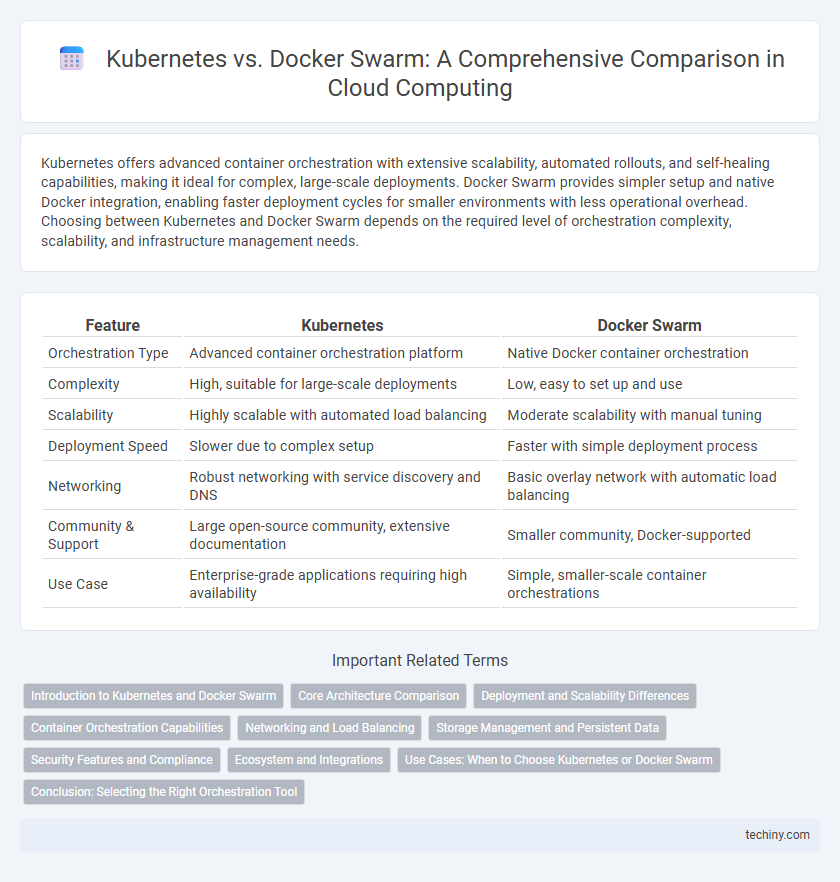Kubernetes offers advanced container orchestration with extensive scalability, automated rollouts, and self-healing capabilities, making it ideal for complex, large-scale deployments. Docker Swarm provides simpler setup and native Docker integration, enabling faster deployment cycles for smaller environments with less operational overhead. Choosing between Kubernetes and Docker Swarm depends on the required level of orchestration complexity, scalability, and infrastructure management needs.
Table of Comparison
| Feature | Kubernetes | Docker Swarm |
|---|---|---|
| Orchestration Type | Advanced container orchestration platform | Native Docker container orchestration |
| Complexity | High, suitable for large-scale deployments | Low, easy to set up and use |
| Scalability | Highly scalable with automated load balancing | Moderate scalability with manual tuning |
| Deployment Speed | Slower due to complex setup | Faster with simple deployment process |
| Networking | Robust networking with service discovery and DNS | Basic overlay network with automatic load balancing |
| Community & Support | Large open-source community, extensive documentation | Smaller community, Docker-supported |
| Use Case | Enterprise-grade applications requiring high availability | Simple, smaller-scale container orchestrations |
Introduction to Kubernetes and Docker Swarm
Kubernetes is an open-source container orchestration platform designed for automating application deployment, scaling, and management across clusters of hosts. Docker Swarm offers native clustering and orchestration for Docker containers, enabling easy setup and simpler management of containerized applications within Docker environments. Both tools streamline container orchestration but differ in scalability, deployment complexity, and feature sets optimized for various cloud computing workloads.
Core Architecture Comparison
Kubernetes features a master-worker architecture with multiple control plane components like the API server, scheduler, and controller manager, enabling high scalability and fault tolerance. Docker Swarm uses a simpler manager-worker model with built-in clustering and orchestration, relying on Raft consensus for state management. Kubernetes' architecture supports advanced features such as custom resource definitions and automatic self-healing, while Docker Swarm offers ease of setup and native Docker integration.
Deployment and Scalability Differences
Kubernetes offers advanced deployment strategies such as rolling updates and canary deployments, ensuring minimal downtime during application updates, while Docker Swarm provides simpler, easier-to-use deployment but with fewer customization options. Scalability in Kubernetes is highly robust, supporting automatic scaling through the Horizontal Pod Autoscaler and handling large, complex clusters efficiently, whereas Docker Swarm's scaling is more limited, relying on manual scaling commands and suitable for smaller workloads. Kubernetes' extensive ecosystem and integrated monitoring tools further enhance its capability to manage dynamic, large-scale containerized applications compared to Docker Swarm's more lightweight approach.
Container Orchestration Capabilities
Kubernetes offers advanced container orchestration capabilities with automated deployment, scaling, and management of containerized applications across clusters, supporting complex workloads and self-healing features. Docker Swarm provides simpler orchestration focused on ease of use and rapid setup, ideal for smaller-scale environments with native Docker integration. Kubernetes excels in multi-cloud and hybrid cloud deployments with extensive ecosystem support, while Docker Swarm is optimized for straightforward Docker-centric container orchestration.
Networking and Load Balancing
Kubernetes excels in networking with its robust Container Network Interface (CNI) plugins, enabling seamless communication across pods and services with advanced network policies. It provides built-in load balancing through Services, utilizing kube-proxy to distribute traffic efficiently and support various load balancing algorithms. Docker Swarm offers simpler, integrated overlay networking and basic load balancing, automatically distributing incoming requests among containers but lacks the extensive customizability and scalability features found in Kubernetes.
Storage Management and Persistent Data
Kubernetes offers advanced storage management with native support for persistent volumes (PVs) and dynamic provisioning using various storage plugins like CSI, enabling seamless integration with cloud storage solutions. Docker Swarm provides basic volume handling but lacks the extensive ecosystem found in Kubernetes, limiting its ability to manage persistent data at scale. Kubernetes' robust persistent volume claims (PVCs) and stateful sets deliver reliable data retention and container orchestration, making it the preferred choice for production environments requiring complex storage management.
Security Features and Compliance
Kubernetes offers advanced security features such as role-based access control (RBAC), network policies, and integration with external identity providers to ensure granular permission management and secure container orchestration. Docker Swarm provides basic security through mutual TLS encryption and node authentication but lacks the extensive compliance and policy enforcement capabilities found in Kubernetes. Enterprises handling sensitive data often prefer Kubernetes for its robust security framework and comprehensive compliance support including standards like HIPAA, GDPR, and PCI DSS.
Ecosystem and Integrations
Kubernetes boasts a vast ecosystem with extensive integrations across major cloud providers like AWS, Google Cloud, and Azure, supporting advanced features such as Helm for package management and Prometheus for monitoring. Docker Swarm offers simpler integration primarily within the Docker ecosystem, enabling seamless compatibility with Docker Compose and Docker CLI but lacks the broad third-party tooling support found in Kubernetes. The rich ecosystem of Kubernetes facilitates scalability and flexibility for complex container orchestration, making it the preferred choice for enterprise-grade deployments.
Use Cases: When to Choose Kubernetes or Docker Swarm
Kubernetes is ideal for complex, large-scale applications requiring high availability, scaling, and automated deployment across multiple nodes, making it suitable for enterprises with intricate microservices architectures. Docker Swarm excels in simpler, smaller-scale environments prioritizing ease of setup and management, appropriate for startups or projects needing rapid container orchestration with minimal overhead. Choosing Kubernetes benefits multi-cloud and hybrid cloud strategies due to extensive ecosystem support, while Docker Swarm offers seamless integration within Docker-native environments for less complex workloads.
Conclusion: Selecting the Right Orchestration Tool
Kubernetes offers advanced features, robust scalability, and a vast ecosystem, making it ideal for complex, large-scale container orchestration. Docker Swarm provides simplicity and faster deployment, suited for smaller applications or teams needing minimal configuration. Choosing between Kubernetes and Docker Swarm depends on project size, resource availability, and desired control over container management.
Kubernetes vs Docker Swarm Infographic

 techiny.com
techiny.com